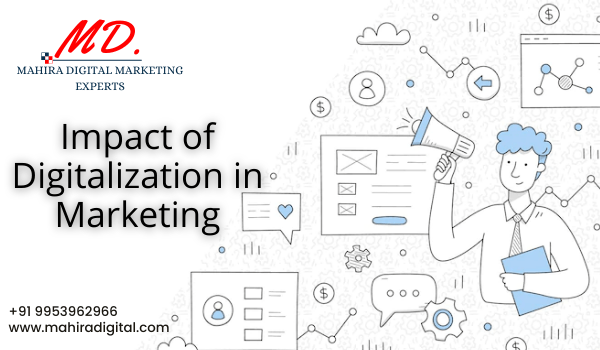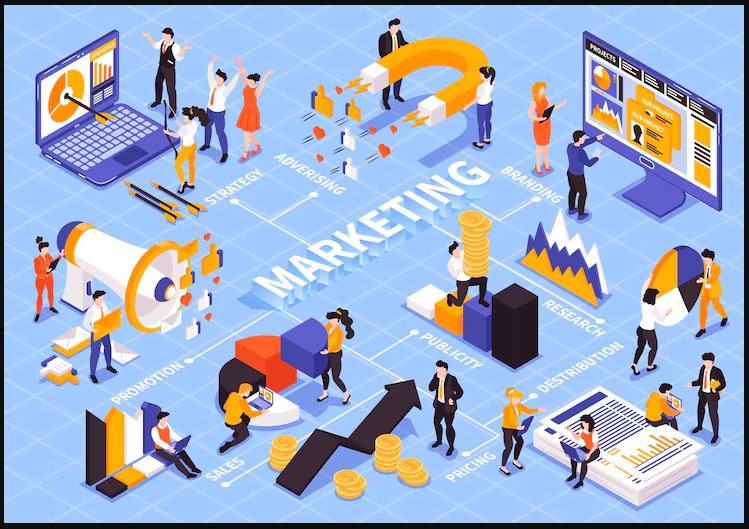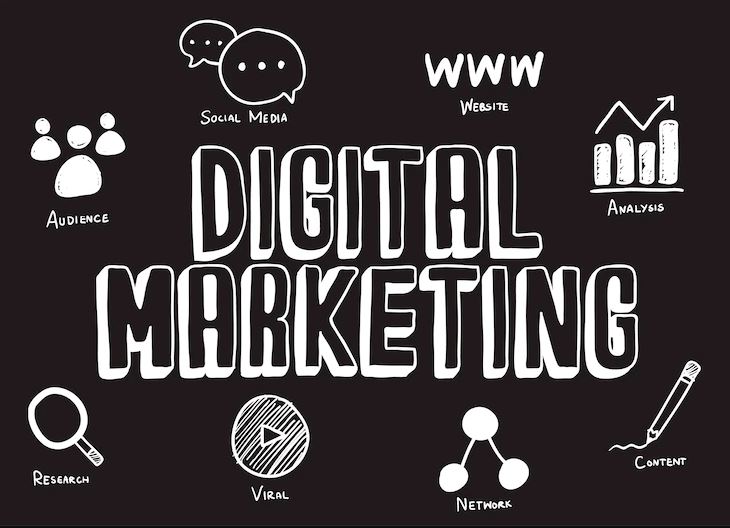Table of Contents
Digitalization in Marketing

Today, every company strives to outperform its competitors. However, without Digitalization in Marketing, the company will struggle to achieve its goals.
For example, you may have implemented an excellent outreach marketing strategy, but how will you know if your marketing campaign is effective if you don’t have a clear way to track its performance metrics?
The role of Digitalization in Marketing comes into play when you use digital tools in your marketing campaigns. Then you can effectively target the right type of audience for the products or services you’re offering. For example, when directing prospects to your physical store, your website will come in handy. If you do not pursue digital marketing tactics such as SEO, pay-per-click, or email marketing, you will remain far behind your competitors.
Before delving into the role and impact of Digitalization in Marketing, it is critical first to grasp the fundamentals.
What exactly is digitalization?
Digitalization is the use of digital technologies to alter a business model and generate new revenue and value; it is transitioning to a digital business.
The Advantages of Digitalization in Marketing

Digital solutions can simplify a country’s security and intelligence systems, as well as its economy and infrastructure.
For citizens, digitalization promises much-needed improvements in the delivery of public services, such as government/bank-issued certificates, and other services, such as financial or other consulting services.
Digitalization in Marketing can facilitate global trade and settlement.
Defend against unethical practices like embezzlement and money laundering.
Digital platforms connect buyers and sellers directly, eliminating the need for a middleman.
The youth are encouraged by digital platforms.
Marketing and advertising costs are lower – Small businesses can easily implement them without breaking the bank to manage advertising for their products and services.
The results are more quantitative. You can now answer the question, “Which half of your advertising spend brings you results?”
Allows for more precise targeting – accurately reaching your ideal consumer.
The Impact of Digitalization in Marketing

1. Prompt Customer Feedback
Direct communication with your current and prospective clients is enabled by Digitalization in Marketing. This direct interaction and engagement provide businesses with more immediate customer feedback than traditional marketing tools.
Customers can now express their opinions and provide feedback about their experiences, what they think about the product, and what features they would like to see in future launches/versions. Online customer service representatives can provide customers with immediate assistance. An instant chat with a current customer can inspire new product designs.
2. Planning for the Short Term
Short-term planning has become important in this evolving, challenging, and competitive economy and business environment because it limits taking uncalculated risks. A short-term planning strategy also provides businesses with prominent and optimal use of available resources. Furthermore, successful marketing and strategic business outcomes can lead to a smart, professional competitive advantage.
3. Customers are easily accessible through digital marketing channels.
Accessing your customers has become much easier, thanks to technological advancements. Given the growing number of tech users and their high engagement with digital means, you may wonder why we are emphasizing digital means so much. Smartphones, iPods/iPads, laptops, notebooks, mobile phones, and smart TVs have created a fantastic opportunity for business professionals to use digital media to support their products.
As a result, reaching out to the target market and connecting with current and prospective customers becomes easier. Meanwhile, through web surfing, customers have a more comprehensive choice to reach and learn more about various brands and companies in seconds. Websites are now considered a business organization’s open office; working 24 hours a day entails 365 days open by providing access to current and new customer base.
4. Referrals and a large client base with a small budget:
Social media fans and users have evolved into excellent sources of referrals. Also, keep in mind that quality products help spread the word and build brand awareness through referral marketing. Several social media users spread the word.
Furthermore, digital marketing provides extensive communication coverage while communicating the company’s message to a large number of people on a low-cost budget. It also includes free online marketing and promotion tools, such as websites.
The budget for digital marketing has been determined to be less than the budget for traditional marketing. Bulk SMS and email campaigns can reach many customers on a small budget. Email marketing has been adopted not only by SMEs but also by large corporations.
5. More Effective Digital Branding
Digitalization in Marketing is far more effective with frequent digital marketing campaigns. It also leads to greater brand visibility in digital media than in traditional marketing tools. Every day, understanding various brands on digital media generates positive associations with current and prospective customers.
It makes a strong first impression and builds a strong brand through digital marketing. It includes buyer personas ranging from brand recognition to purchasing to brand loyalty.
6. Increased Productivity Through E-Learning:
The e-learning platform is now a source of productivity and great value for business stakeholders. To compete globally in the busy schedules of business experts and competitive environments, businesses require highly advanced and creative professionals. As a result, self-paced and limitless knowledge can be a tactical and necessary business advantage for small and medium-sized businesses.
7. The Effect on Business Intelligence
Business intelligence is critical in global economies. Businesses with more dependable and powerful Business Intelligence are more contentious and long-lasting than those with weak Business Intelligence. Digitalization in Marketing has played a role in transforming simple businesses into highly intelligent enterprises that outperform their competitors and provide strategic leadership in the industry.
8. Business Activity Efficiency
Digitalization in Marketing entails closing the efficiency gap in business operations. From production to shipment tracking, monetary transactions and ERP implementation enable a company to work smarter and more efficiently. Lowering costs, utilizing fewer resources, and improving yields are key advantages for a business with significant digitalization power. This also improves the BPI, or Business Process Improvement, a key indicator of a company’s competitiveness and value creation.
9. Increased Customer Satisfaction
Customer happiness and satisfaction have been major focuses for businesses in the current global economy. Digital marketing can increase customer satisfaction by providing them with the most up-to-date and advanced information about the brands they use and like via emails, SMS, e-Newsletters, and telemarketing/contact center interactions. All of these actions have a long-term impact on increasing customer satisfaction. Furthermore, we can examine how customers and visitors to rate websites, products, information, interactions with online agents, and other factors contributing to customer satisfaction.
10. Analytics for Future Insight
With the analytical platforms available on digital marketing channels, Digitalization in Marketing has paved the way for future insights. Analytic specialists use LinkedIn, Facebook websites and Search Engine Optimized analytics, and Bing/ Google digital marketing campaigns for future forecasts about marketing actions and future brand-building plans. The data has been an excellent source for improving work and generating good business while exploring new markets. As a result of embracing future business challenges, digital marketing experts and business stakeholders have paved the way.
The Effects of Digitalization in Marketing

Marketing is rapidly evolving into a society that is dominated by technology. As a result, all industries are embracing digitalization. It impacts all sectors, including education, agriculture, and business ecosystems.
The role of digitalization in the development of business ecosystems is becoming increasingly important. Accommodating technology is a beneficial factor in business graphs. It makes work systems more comfortable and less complicated, allowing people to focus on their work without being distracted by external factors that were previously prevalent.
Businesses can now communicate more quickly, thanks to Digitalization in Marketing. Businesses are currently developing systems to improve their digital growth, one of the most important factors. The world is now online, and businesses must exist online to exist offline. Companies are now reorganizing their old business strategies to incorporate new technological developments into their business models.
Developing new strategies has provided businesses with a new and distinct framework for operation. The inclusion of technology on a larger scale has become more comfortable to scale heights and compete. On the other hand, digitalization has exposed businesses to a vastly different landscape, necessitating constant innovation in their operations. The systems would be inactive without innovation, resulting in a declining graph.
With the prevalence of social media, businesses must now implement targeted marketing strategies. It enables them to generate more leads and expands the brand’s or product’s reach. Even business storage devices have evolved. Almost all businesses are now shifting to cloud computing technology to manage massive amounts of data. In addition, cloud computing has sparked the development of numerous cybersecurity solutions.
Digitalization in Marketing has significantly impacted how businesses operate and are completed today. We may see the business landscape completely changing as more prominent AI and other technologies applications emerge.
Conclusion on Digitalization in Marketing

We’ve seen how digitalization has changed the way businesses operate in this post. To stay ahead of their competitors, businesses are turning to advanced technology. So, what are you holding out for? Begin implementing Digitalization in Marketing right away.

It is very helpful content, because digitalization in marketing is very important in these days.
Hi Mr. Aftab,
Thank you so much to read this blog about digitalization in marketing.
Thanks for sharing this blog related to digitalization in marketing.
I know this is the best blog on digitalization in marketing. Thanks for your feedback.